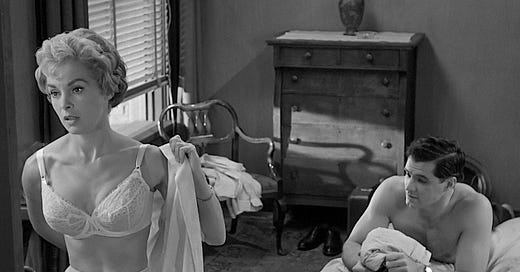CHAPTER TWO: The Astrology of Alfred Hitchcock's Psycho
With Psycho's opening credits and frantic overture, we're transformed from spectator to lurid voyeur in a heartbeat. Captivated, there is nowhere to go but in.
You’re reading WOODRUFF. I cover the convergence of pop culture, psychology, and astrology with a bit of the Tarot and dream work tossed into the fray.
Throughout October, I will be serializing my new book, The Astrology of Alfred Hitchcock’s Psycho.
Chapter One is available here.
CHAPTER TWO
Genesis
“To see and listen to the wicked is already the beginning of wickedness.” –Confucius
AS A CHILD, I RECALL listening to my mother and her gaggle of friends discuss Psycho in hushed tones during one of their evening cocktail covens. My mom, mindful of my eavesdropping, scooted me out of the room when the gal group became agitated: Someone had broached the hot topic of the film’s brutal shower murder. My attention jumped to a fever pitch, forcing the film’s allure into my imagination.
I recently enjoyed a retelling by Stephen Rebello, author of Alfred Hitchcock: The Making of Psycho, who was lucky enough to attend a premiere of Psycho when he was a young boy. In the interview, he reminds us of what Hitchcock sensed about the late 1950s. Audiences were bored with films that reinforced saccharine-infused sexual mores. They didn’t know what they wanted, but they were also ready for something “bolder and stranger and darker…It was one of the biggest sucker punches in the history of cinema,” he says of the film.
Sitting in the audience as a kid, Rebello was thrilled at the sight of his teacher running up the aisle to exit the theater with her hand covering her mouth in sheer terror. “That was really triumphant for a kid to see a school teacher reduced to a puddle,” he said. “And I can remember men screaming.”
Like me, Rebello eavesdropped on his parents and their friends as they excitedly discussed the film. When Stephen’s mother asked what the film was about, one confused adult lowered his voice and whispered into her ear: “It’s about a queer!”
This was a muddled description but the best some people could compute in a decade still reeling from the Christine Jorgensen story, where a military guy decided to undergo a ‘sex reassignment surgery’ and become a woman.
I’ve never escaped from Psycho because, like any artist’s masterwork, each reading, hearing, or viewing reveals unique insights and psychological fuckery. Genuine works of art are indeed timeless. They have a life. They walk beside us and talk to us. Given enough attention, they get under our skin.
Like da Vinci, who carried the Mona Lisa wherever he traveled—he considered his painting ‘apotropaic’—a charm to ward off evil spirits—I’ve been equally charmed by Psycho. First as a film aficionado, then as a writer and counselor fascinated by psychology, and finally as an astrologer.
I return to Psycho at least once a year, always during the fall when the Sun touches off my birth chart’s Moon (which, coincidently, conjuncts Hitchcock’s natal Moon in Scorpio). The diminishing sunlight, the death of my garden, and Halloween looming: Who wouldn’t want to watch an expertly orchestrated cinematic excavation of the Devouring Mother archetype?
Given Psycho‘s nerve-wracking opening credits (and overture that sweeps in on you like one of Hitchcock’s rouge ravens from The Birds), I understand how I overlooked the ‘open secret’ I’m about to share with you—despite dozens of viewings.







